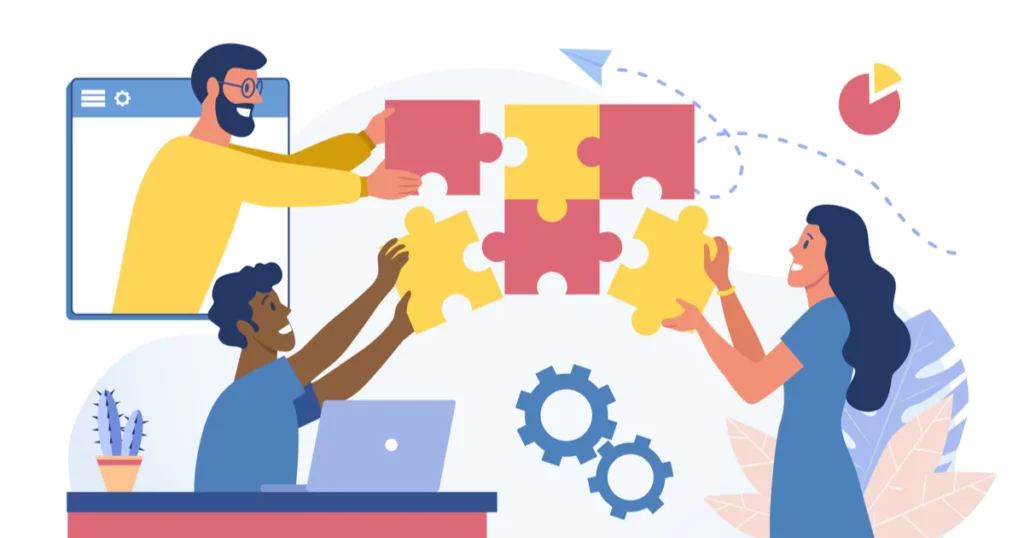Wondering if team building can benefit your company and teams? The answer is definitely yes. While certainly not a cure-all, team building offers a host of benefits that directly improve key performance indicators and drive measurable business results. By incorporating intentional team building efforts, you’ll cultivate high-functioning teams that can collaborate to solve problems, communicate more clearly, and innovate solutions for your business. Keep reading to learn how to help your teams move forward together on the path toward success.
Table of Contents
What are the Benefits of Team Building?
Who Can Benefit from Team Building?
What Is Team Building?
Before diving into all the business benefits of team building, let’s define it. Team building is the continuous process of improving the cohesion, efficiency, and performance of a group through intentional activities and strategies. It’s an intentional effort to ensure that the whole (or team) is greater than the sum of its parts (or individual contributors).
Examples of Team Building Activities
And as anyone who’s been on a team can tell you, working together seamlessly is not always guaranteed. Teams comprise individuals with different skill sets, strengths, weaknesses, experiences, ways of working or communicating, and more. With so many differences to manage, it’s a wonder that companies aren’t more intentional about team building efforts.
What are the Benefits of Team Building?
To fully understand the benefits of team building, we need to back up and unpack the role of a team at a company. Individuals form teams and teams form departments or functions, which make up the company. You can consider teams the building blocks of your organization, each with a clear purpose and stated objectives that relate to the overall company aims and goals. These team objectives can take shape as revenue targets, customer satisfaction numbers, production targets, and more. By extension then, team building is ultimately just an investment in achieving your company’s goals easier, faster, or better. So, team building is definitely worth getting excited about — and worth the investment.
Keep reading to learn more about all the benefits of team building!
1. Encourages Teams to Drive Key Business Results
As Henry Ford said, “If everyone is moving forward together, then success takes care of itself.” When you invest in team-building efforts and activities, you create forward momentum amongst your teams which can translate to the accomplishment of the key business results those teams are responsible for.
Team building addresses soft skills like problem-solving, communication, collaboration, delegation, and the ability to divide and conquer.
Whether you need to increase sales, lower safety incidents, work with more efficiency, reduce downtimes, or increase customer satisfaction, team building will provide the underlying framework necessary to collaborate and achieve those goals.
2. Uncovers Individual Strengths and Weaknesses
Team activities provide the playground for real skills to manifest and can create opportunities to uncover underlying strengths and weaknesses that can otherwise take time to surface.
Through playing games together, you’ll learn who can communicate clearly and quickly, solve problems, find out-of-the-box solutions, anticipate outcomes, and more!
Everyone has strengths and weaknesses. High-performing teams seek to maximize everyone’s strengths and account for all the weaknesses during the pursuit of a task or goal. Create opportunities to learn more about your teammates, so your next project runs more smoothly.
3. Improves Team Communication
Communication is key, and 63% of leaders say team communication improved after participating in team-building activities. This isn’t too surprising. Team activities encourage people to put their heads together, collaborate, and solve problems with limited time. Good communication is critical to that process.
4. Lowers Employee Turnover
Team building helps engage employees and engaged employees tend to stay longer. When employees feel they are part of teams that can properly communicate and collaborate, they are less likely to look for other jobs.
High employee turnover can be disruptive to the work environment. Team building is a simple way to encourage your people to form connections and ways of working that inspire them to stay.
5. Enhances Employee Morale and Trust
Having fun together is, well, fun! Team building activities boost employee morale and trust by reminding teams that it isn’t always just about the work, it’s about the relationships, too! In fact, 61% of leaders say morale improved after team-building exercises. So, what are you waiting for?

Who Can Benefit from Team Building?
Any company and team can benefit from team-building exercises!
Virtual Teams
The rise in virtual work environments has been beneficial for millions of employees. But virtual work can also render employees feeling less connected to colleagues. Team building encourages connections among employees whether they previously worked together in an office every day or have never met.
From conventional to quick or unusual virtual team building activities, there’s something for every virtual team dynamic.
In-Person Teams
Seeing each other every day doesn’t guarantee flawless collaboration and communication — just ask any married couple! Team building for in-person teams is just as crucial as it is for virtual teams. Regardless of where teams work, strong teams are built. Incorporate some team building into your next in-person event!
Hybrid Teams
If your team is hybrid, that might mean members spend part of their time in person and part virtual. Hybrid may also mean part of your team is in person and some are totally virtual! Whichever structure you follow, you can benefit from practicing your collaboration skills through team activities.
Departmental/Functional Teams
Departmental teams that increase their ability to work together will have an easier time hitting their goals. From HR and Customer Service to Sales and Marketing or the entire Leadership Team, every department or company team can increase their ability to collaborate with one another through team building.
Cross-Functional Teams
Cross-functional teams are comprised of members from multiple functional areas within a company — for example, sales, customer service, manufacturing, etc. Companies benefit greatly from building up cross-functional teams because they work to reduce “silos” so that folks from different areas of the business can partner to tackle problems. But by nature of including members of different departments, you get different ways of working and expectations.
Team building is particularly important for these teams as they don’t always have the opportunity to work with one another.
Large Teams
Wrangling a large team for a team building activity is difficult but particularly important for big groups. By nature of size, it’s harder to get to know colleagues on bigger teams and harder to get a sense of the different skill sets and ways of working and communicating. If your team is bigger than 100 people, it might be time to start planning your next team building activity!
Small Teams
It’s true: small teams communicate more and are often more productive. And so, you might be tempted to think that small teams don’t require as much team building. Not so fast. Small teams are also susceptible to becoming echo chambers and constantly putting the same people in the same roles.
By incorporating more team building activities for smaller teams, you’ll create additional opportunities to illuminate any hidden talent and give different team members a chance to show off skills that the whole team can benefit from!

Who Can Lead Team Building?
Short answer: Just about anyone!
Internally Hosted
Good news! You don’t have to be an expert on team building to lead activities for your company or team. You only need to be willing. Often, teams will rotate who spearheads or organizes the next activity to keep things fun and fresh.
Tip: People managers and senior leaders should make an effort to plan and participate in team-building activities to ensure that employees recognize these events as part of the culture.
If you plan to host team-building activities yourself or want to equip others to do so, check out these resources to make things easier!
- Easy icebreakers to get the conversation flowing
- A complete guide to Zoom to ensure you take advantage of all the features
- Fun, engaging team building games for Zoom
- Some essential team building tools
The most important factor is to have fun together as you complete the activities! If there’s extra time, have folks share some key moments where the team pulled together to complete the activity.
Externally Hosted
If you’re looking for activities that everyone can join in on without worrying about hosting duties, you can outsource the role of host as you try more of these activities with your team!
- A virtual escape room where you problem-solve and work together as a team
- Skip complicated rules and enjoy fast-paced team fun with online game shows featuring an energetic host on Zoom
- Tap into your inner detective and decode evidence as a team in some competitive mystery games
Conclusion: Great Teams Aren’t Hired, They’re Built
High-performing teams are no accident. If you’re looking for employees to deliver results as a team, first ensure they understand how to work with one another. That means you’ll need to be intentional about teaching your people to collaborate and create opportunities for them to practice. Here’s the good news: team-building activities are fun and your employees will thank you for it! So, what are you waiting for?

